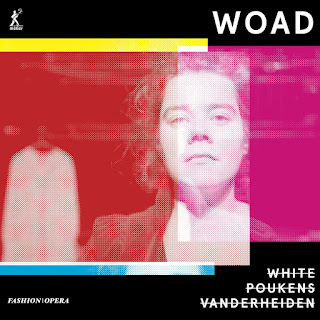Alastair White Woad; Kelly Poukens, Suzy Vanderheiden; Metier
Reviewed by Robert Hugill on 16 January 2022 Star rating: (★★★★)
A metaphysical meditation on the art of transformation, White's latest opera is a dazzling tour-de-force for just two performers
Alastair White's Woad is the third in his fashion|opera cycle [see my interview with Alastair for his thoughts othe philosophical underpinning of the cycle], following Wear and Rune. Alastair White's Woad: A Fashion - Opera, Seven Scenes from the Tale of Tam Lin is performed by soprano Kelly Poukens and saxophonist Suzy Vanderheiden on Metier.
In the medieval Scottish Borders, a young boy is bewitched – into the form of an ape, an adder, a speck of dust. But is it his shape that twists and churns, or that of the world around him? These are the questions considered by Woad. The piece is inspired by the Scottish Border ballad Tam Lin a tale as much about the idea of transformation whilst retaining one's true qualities. It is this aspect of the ballad that White has picked up on. In dramatising Tam Lin, he boils the idea of opera down to its essentials, just a voice and an instrument. Soprano Kelly Poukens does not play a particularly character, instead White's seven scenes (the libretto is his own) are a meditation on different aspects of transformation.
He uses the story to contemplate worlds of co-incident possibilities, and his texts for the seven scenes are profoundly poetic in their own right. The final scene, 'The Transformation of Tam Lin' features a text that is laid out in a way that makes it a work of art in its own right; the multiple columns of White's text reflecting the multiple possibilities of his imagined universe.
His writing for both soprano and saxophone is challenging, and often Poukens' vocal line is highly instrumental, the two weaving together like two instruments. Musically the work is dazzling in that way that White mines the combination of the two in so many different ways. Throughout the writing is complex and challenging, yet in each of the scenes White reflects musically on different aspects of the story. If you are interested, you can analyse the various compositional strategies that White uses, but you can also stand back and simply enjoy the sheer variety on offer here.
Poukens and Vanderheiden impress with their performances, both the technical grasp of the music and their sense of White's idiom (Poukens performed in White's two previous operas). If I have a moan, it is the single point that to follow the text you very definitely need the printed libretto in front of you.
Technically complex, dazzling in its confidence at writing for just soprano and saxophone, philosophically deep this is a work that eludes definition. Almost like Tam Lin himself, Woad slips through the fingers, is it an opera, a song-cycle, a cantata, a piece of music theatre, all four or none? So, whilst White is ostensibly meditating on the art of transformation via a mythical man who was transformed by turns into a variety of different forms, he is also contemplating what it is to write opera in the 21st century. And the work becomes particularly apt as it was recorded in January 2021 (and performed live later that year), so a work for just two performers fits very much into the ethos of boiling down performance to its essentials that has happened since March 2020. In a way, White's Woad is a 21st century metaphysical twin to Judith Weir's King Harald's Saga, her ten minute grand opera performed by a single soprano.
The performers have filmed the opera in a production that features fashion by Renli Su, this is available via YouTube. The opera's libretto is also available for download.
Alistair White (born 1988) - Woad (2021) [57.12]
Kelly Poukens (soprano)
Suzy Vanderheiden (saxophone)
METIER MSV 28617 1CD [57.12]
Available for sale, streaming or download [link tree]
Never miss out on future posts by following us
The blog is free, but I'd be delighted if you were to show your appreciation by buying me a coffee.
Elsewhere on this blog
- A sense of ritual: Edward Jesson's Syllable, a work of complex musical theatre, is premiered by Trinity Laban Opera - opera review
- Still in cracking form: Verdi's Nabucco returns to Covent Garden - opera review
- The sense of eternity that can be found in the simple doing of something: Sven Helbig's Skills - interview
- In stunning control of his material: Gavin Higgins' Ekstasis from Piatti Quartet, Fidelio Trio, Thomas Gould, David Cohen, Sara Roberts - record review
- Personal Stories: Cevanne Horrocks-Hopayian's Welcome Party on NMIC - record review
- Panache, intensity and vivid story-telling from Claire Booth and Christopher Glynn in Modest Musorgsky: Unorthodox music at Wigmore Hall - concert review
- A joy in complexity of texture and rhythm: Sinfonietta Riga in four recent works written for them by Lativan composers - record review
- We live in a world where nothing has been left untouched by humanity: composer Jan-Peter de Graaff chats about the inspirations for his new cello concerto - interview
- Colour and movement: Patrick Allies and Siglo de Oro transport us to 17th century New Spain - concert review
- Full of the joy of Christmas: music by Heinrich Schütz and his contemporaries from Arcangelo at Wigmore Hall - concert review
- Hymns to the Virgin: the Tallis Scholars at St John's Smith Square's Christmas Festival - concert review
- The Other Erlking: Songs and Ballads of Carl Loewe, from Nicholas Mogg and Jâms Coleman - record review
- Home












No comments:
Post a Comment